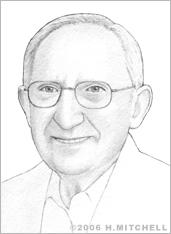Sydney Pestka
Though his name may be unfamiliar to some, the remarkable achievements that scientist and inventor Dr. Sidney Pestka has contributed to the medical and biotechnology fields have touched the lives of millions around the world and helped patients battle a number of serious illnesses and diseases, from cancer to multiple sclerosis to dozens of viruses.
Born in New Jersey in 1936, Pestka earned his undergraduate degree in chemistry at Princeton University in 1957, and in 1961 he completed an MD at the University of Pennsylvania School of Medicine. Next he completed a pediatric and medical internship at Baltimore City Hospital, and joined the National Heart Institute in 1962, where he worked in the laboratory of Dr. Marshall W. Nirenberg, whose work on the genetic code — which Pestka was deeply involved with — would later earn Nirenberg the Nobel Prize in Medicine.
While working for Nirenberg, Pestka became interested in protein synthesis when he discovered the process by which RNA genetic code is translated into protein. Pestka’s work on this project would help to form a basis for understanding in the medical field of the mechanisms behind protein biosynthsis and antibiotic action.
Pestka moved on to the National Cancer Institute in 1966, where he continued research on protein synthesis. While in this position, he also first learned about interferons, which are protective proteins secreted by cells when they are attacked by a virus and then move to other areas of the body to help those cells protect against viral attack. In 1969, he joined the Roche Institute of Molecular Biology in Nutley, New Jersey, where he began focusing his research on interferons.
Interferon was first discovered in 1957 in chickens by Alick Isaacs and Jean Lindenmann of the National Institute for Medical Research in London. Years later, it was discovered that human cells secreted the substance in a similar fashion. Researchers immediately understood that interferon might hold a key that could lead to the production of some incredibly beneficial antiviral drug treatments; however, it was evident that a great deal of work needed to be done in order to find out how these substances might be produced in the large quantities necessary for them to be used in this way.
Pestka decided to devote his research to developing such a process. Over the course of nearly 16 years, he created a process called reverse phase high-performance liquid chromatography (RP-HPLC) for protein purification, to isolate and purify interferon proteins. His laboratory was the first to purify interferons-alpha and -beta, which made it possible for scientists to determine how interferon actually behaved, and how it might be used to treat viruses and cancers. In addition to inventing methods for isolating and purifying interferons, Pestka also developed a way to clone interferons, and was able to produce recombinant interferon-alpha for clinical trials in the early 1980s.
Subsequently, in 1986, the FDA approved interferon-alpha to treat hairy cell leukemia in humans, followed by approval for treatment of chronic hepatitis B and C, and a variety of cancers such as malignant melanoma, some leukemias and AIDS-related Kaposi’s sarcoma. Today, Pestka’s ingenious methods for separating and analyzing proteins is used in laboratories all over the world, with major drug companies such as Schering-Plough Amgen, Biogen and Berlex creating drugs through licensing agreements tied to Pestka’s more than 350 U.S. and foreign patents. His work launched the global, multi-billion-dollar biotherapeutics market, and millions have benefited from treatments based on interferons, with more and more drugs continually in the works.
Pestka founded Pestka Biomedical Laboratories (PBL) in 1990 to continue his research and to provide human interferons to scientists engaged in related studies around the world. He was PBL’s chief scientific officer and chairman of the board in 2006 and his son, Rob, serves as president and CEO. Pestka is now Chairman Emertius of PBL and his son continues as Chairman and CEO. Pestka is also Emeritus Professor of the Department of Biochemistry and Molecular Biology at Robert Wood Johnson Medical School of Rutgers University of Medicine.
Author of more than 400 articles and editor or contributor to several text books, Pestka has been recognized with such distinguished awards as the Warren Alpert Prize from Harvard University, the Elman Waksman Award in Microbiology, and the Milstein Award from the International Society for Interferon and Cytokine Research. In 2002, he was honored with a National Medal of Technology presented by President George. W. Bush. In 2006, he was the recipient of the $100,000 Lemelson-MIT Lifetime Achievement Award.


